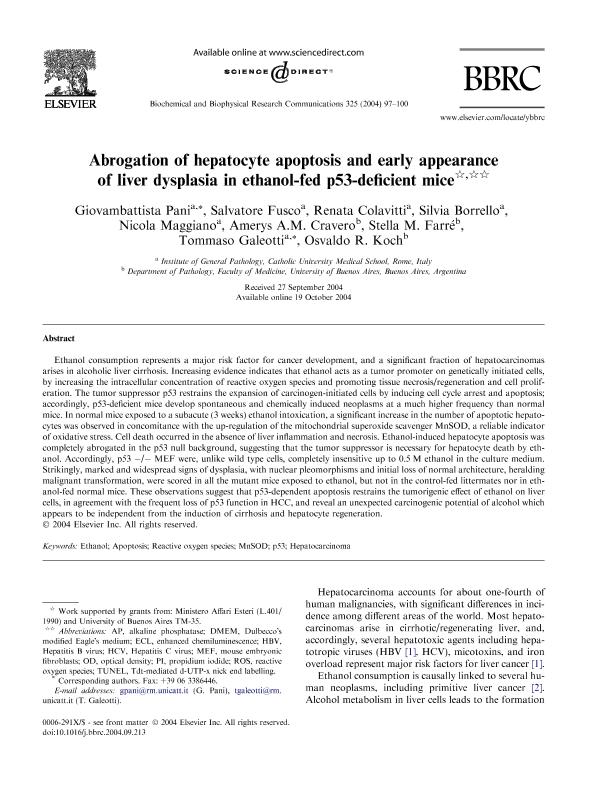Artículo
Abrogation of hepatocyte apoptosis and early appearance of liver dysplasia in ethanol-fed p53-deficient mice
Pani, Giovambattista; Fusco, Salvatore; Colavitti, Renata; Borrello, Silvia; Maggiano, Nicola; Cravero, Amerys A.M.; Farré, Stella Maris; Galeotti, Tommaso; Koch, Osvaldo Raul

Fecha de publicación:
12/2004
Editorial:
Academic Press Inc Elsevier Science
Revista:
Biochemical and Biophysical Research Communications
ISSN:
0006-291X
Idioma:
Inglés
Tipo de recurso:
Artículo publicado
Clasificación temática:
Resumen
Ethanol consumption represents a major risk factor for cancer development, and a significant fraction of hepatocarcinomas arises in alcoholic liver cirrhosis. Increasing evidence indicates that ethanol acts as a tumor promoter on genetically initiated cells, by increasing the intracellular concentration of reactive oxygen species and promoting tissue necrosis/regeneration and cell proliferation. The tumor suppressor p53 restrains the expansion of carcinogen-initiated cells by inducing cell cycle arrest and apoptosis; accordingly, p53-deficient mice develop spontaneous and chemically induced neoplasms at a much higher frequency than normal mice. In normal mice exposed to a subacute (3 weeks) ethanol intoxication, a significant increase in the number of apoptotic hepatocytes was observed in concomitance with the up-regulation of the mitochondrial superoxide scavenger MnSOD, a reliable indicator of oxidative stress. Cell death occurred in the absence of liver inflammation and necrosis. Ethanol-induced hepatocyte apoptosis was completely abrogated in the p53 null background, suggesting that the tumor suppressor is necessary for hepatocyte death by ethanol. Accordingly, p53 -/- MEF were, unlike wild type cells, completely insensitive up to 0.5 M ethanol in the culture medium. Strikingly, marked and widespread signs of dysplasia, with nuclear pleomorphisms and initial loss of normal architecture, heralding malignant transformation, were scored in all the mutant mice exposed to ethanol, but not in the control-fed littermates nor in ethanol-fed normal mice. These observations suggest that p53-dependent apoptosis restrains the tumorigenic effect of ethanol on liver cells, in agreement with the frequent loss of p53 function in HCC, and reveal an unexpected carcinogenic potential of alcohol which appears to be independent from the induction of cirrhosis and hepatocyte regeneration.
Palabras clave:
APOPTOSIS
,
ETHANOL
,
HEPATOCARCINOMA
,
MNSOD
,
P53
,
REACTIVE OXYGEN SPECIES
Archivos asociados
Licencia
Identificadores
Colecciones
Articulos(OCA HOUSSAY)
Articulos de OFICINA DE COORDINACION ADMINISTRATIVA HOUSSAY
Articulos de OFICINA DE COORDINACION ADMINISTRATIVA HOUSSAY
Citación
Pani, Giovambattista; Fusco, Salvatore; Colavitti, Renata; Borrello, Silvia; Maggiano, Nicola; et al.; Abrogation of hepatocyte apoptosis and early appearance of liver dysplasia in ethanol-fed p53-deficient mice; Academic Press Inc Elsevier Science; Biochemical and Biophysical Research Communications; 325; 1; 12-2004; 97-100
Compartir
Altmétricas



